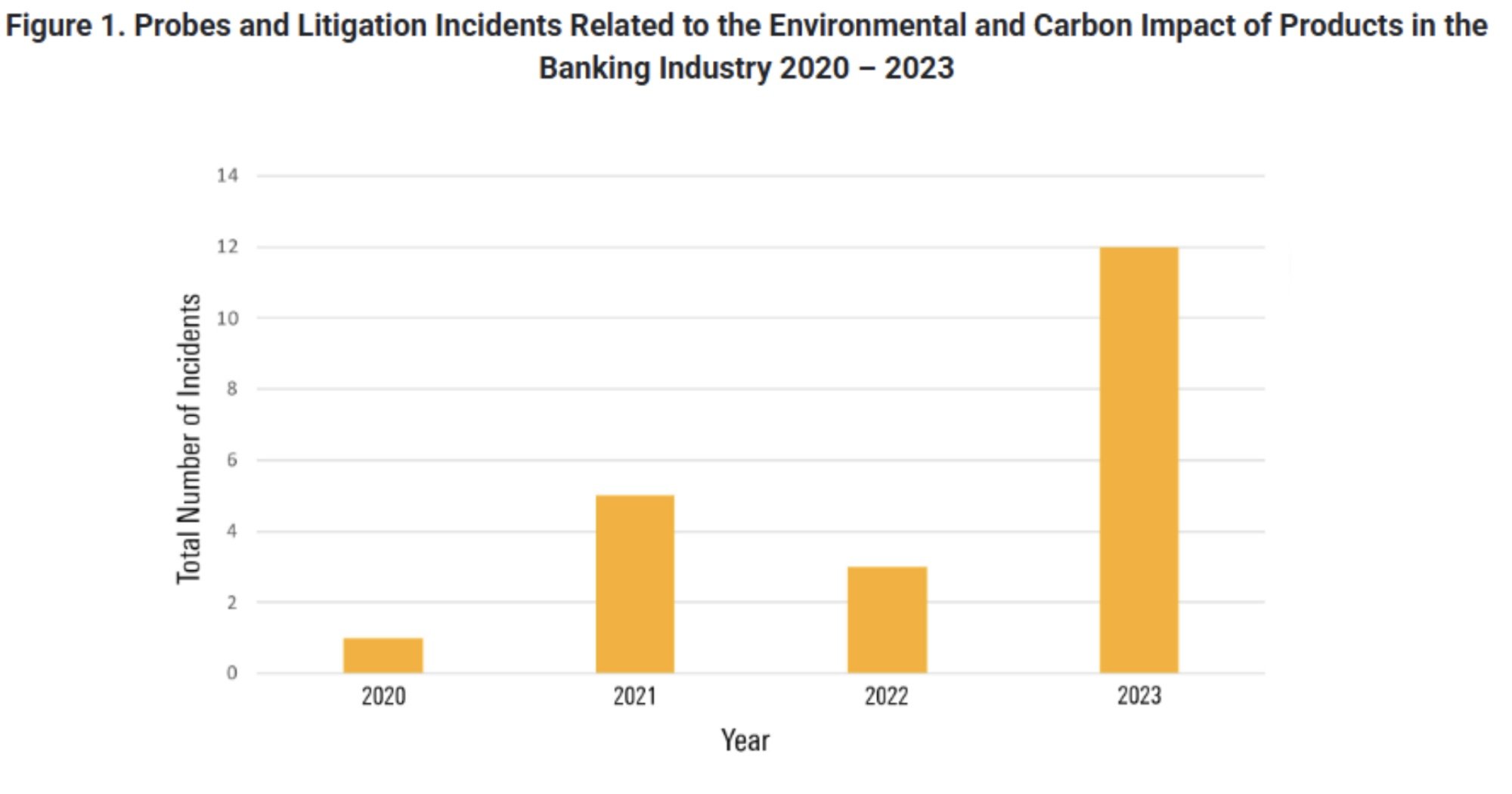50+ Greenwashing statistics to detect fake sustainability claims
Greenwashing is a misleading marketing tactic in which businesses overstate or fraudulently claim that their products, services, or operations are environmentally benign to appeal to conscious consumers without actually reducing their environmental impact.
“Sustainability is the essence and core value of Woola, that is why we exist, and that is why we acquired our B Corp certification.”
— Kelli Roosimägi, Head of Operations at Woola
Global greenwashing trends
Greenwashing has become increasingly prevalent as global environmental awareness grows and consumers demand more sustainable business practices. Below are some notable statistics and trends illustrating this rise:
Increase in greenwashing cases
Between June 2023 and June 2024, global greenwashing cases decreased by 12%, marking the first decline in six years. However, high-severity cases surged by 30% during the same period.¹ Which is the lesser of these two evils?²
In 2024, Europe recorded 918 companies at risk of greenwashing, a decrease of nearly 19% from 2023. Conversely, the United States saw a slight increase of just under 6% in companies linked to greenwashing during the same period.²
There are some countries that have adopted stricter laws, such as the EU adopting the Green Claims Directive which regulates and prohibits the act of Greenwashing. Companies have however adapted to these laws and found grey areas to slip around them.
This is why there’s an increase in the severity of cases and a decrease in the number of cases.
Corporate admissions and consumer perception
Approximately 68% of US executives and 58% of global executives admit to using greenwashing tactics.³
Two-thirds of CEOs in the US admit they aren’t prepared to withstand the potential scrutiny and expectations of shareholders when it comes to ESG.²³
In 2024, 52% of consumers believed organisations were greenwashing their initiatives, up from 33% the previous year.²
These statistics are quite daunting, as we see a rise in consumer scepticism over the years, and a rise in the admission by top company officials, yet the market is still exploding with consumerism skyrocketing amidst the knowledge of misleading information.
Industry-specific insights
In 2024, the oil and gas sector accounted for the majority of greenwashing cases.⁴
The banking and financial sectors experienced a 70% increase in climate-related greenwashing incidents over the past year, with over 50% of these incidents involving associations with fossil fuel companies.⁵
Regulatory actions and fines
The largest greenwashing fine to date was imposed on German car manufacturer Volkswagen for falsifying emissions data, estimated at $35 billion.⁶
Financial regulators have intensified scrutiny over sustainability claims, leading to significant fines for misstatements about ESG investment processes.⁷
In Australia, Vanguard Investments faced a $12.9 million fine for misrepresenting the environmental, social, and governance (ESG) credentials of one of its funds.²⁷
Deutsche Bank's asset management division, DWS, agreed to pay $25 million to the US Securities and Exchange Commission (SEC) over allegations of ESG misstatements ²⁸
Goldman Sachs asset management paid $4 million to the US Securities and Exchange Commission (SEC) for misstatements about its ESG investment processes.²⁸
The table clearly shows that the fines imposed on companies found guilty of greenwashing are quite hefty and a big blow to their reputation.
Greenwashing in financial instruments
From 2018 to 2023, over $286 billion in SLL’s (sustainability-linked loans ) were issued to industries known for environmental damage, including fossil fuels, mining, and deforestation. Critics argue that these loans often lack strict accountability, facilitating greenwashing.⁸
These statistics underscore the growing concern over greenwashing across various sectors and highlight the need for increased transparency and accountability in corporate environmental claims. With a mismanagement of funds of this calibre, actual sustainability growth is stunned and forced to the back burner while fake “green” corporations grow influentially.
Greenwashing by region
Greenwashing varies in prevalence and regulatory response across different regions. Below is an overview of greenwashing trends and notable cases in Europe, the United States, Canada, Australia, and Asia.
Europe
The European Union has introduced the Green Claims Directive, requiring companies to substantiate environmental claims with scientific evidence and third-party verification.⁹
59% of ”green” claims made by top European fashion brands are misleading.¹⁴
40% of corporate environmental claims made online were likely deceptive or false.¹⁰
Greenwashing indicators and claims
| Indicator | Description |
|---|---|
| Misleading claims | 53% of ”green” claims provide vague, misleading, or unfounded information.14 |
| No supporting evidence | 40% of claims lack any supporting evidence.14 |
| Weak verification | Half of all "green labels” offer weak or non-existent verification.14 |
| Number of ”green” labels in the EU | There are 230 sustainability labels and 100 “green energy” labels in the EU, with varying transparency.14 |
Despite implementing the Green Claims Directive, the prevalence of greenwashing has yet to decrease significantly. We need to take a closer look at the fashion industry in the EU market, and further in this article, we will do a more intensive overview.
With a significant rise of both local and high fashion brands, this has a far-reaching influence on millions of minds, and therefore should be held accountable for any form of greenwashing.
United States
A 6% increase in liked greenwashing cases has been seen in the US in 2024.²
The US Securities and Exchange Commission (SEC) has intensified scrutiny over sustainability claims, leading to significant fines for misstatements about ESG investment processes. The Deutsche Bank's DWS paid $25 million to the SEC for such misstatements.¹⁰
Tyson Foods faced a lawsuit for greenwashing, accused of misleading consumers about its environmental commitments without a concrete plan to meet its goals.¹¹
With the global economic power that the US possesses, an increase in greenwashing sends a shiver down every economy's spine. The influence that the US market has is far too vast to allow for an increase in misleading information to seep through.
Canada
In June 2024, Canada passed Bill C-59, amending the Competition Act to introduce new requirements for companies making environmental claims. These claims must be substantiated according to "internationally recognised methodology," with the burden of proof on the corporate entities.⁹
“Canada is long overdue for robust green marketing rules that require businesses to prioritise truth in advertising. The Competition Act amendments, paired with strong guidance from the Bureau, mark a pivotal moment where clear standards can be set that require transparency and accountability from companies making environmental claims.”
— Tanya Jemec, Eco-justice lawyer
Australia
A 11.5% increase in the number of companies at risk of greenwashing has been seen is Australia in 2024.²
The Australian Securities and Investments Commission (ASIC) has actively countered greenwashing, enforcing honesty in environmental claims. ASIC has launched legal proceedings and issued fines for misleading statements about environmental, social, and governance (ESG) track records.²
In September 2024, the Federal Court ordered a record-breaking greenwashing penalty against Vanguard Investments Australia.²
Australia has implemented thorough laws regulating greenwashing, and the increase of greenwashing can be understood due to new, more rigorous measurements that which companies are held against.
Asia
In 2024, Asia followed behind Europe and North America in the number of companies at risk of greenwashing, with a decrease of 19% from 2023.²
Countries like Singapore, South Korea, and Japan have introduced regulations to combat greenwashing. The Singapore Green Labelling Scheme (SGLS) aims to help the public identify environmentally preferred products, while South Korea's Environmental Technology and Industry Support Act addresses misleading environmental claims.¹²
59% of companies in Asia, Europe, and North America participated in greenwashing, including misleading claims regarding climate-related issues like global pollution and greenhouse gas emissions.¹³
These regional insights highlight the global challenge of greenwashing and indicate the long way forward to eradicate this lucrative industry of misleading and fallacies.
Greenwashing by industry
Greenwashing is a most prevalent practice in industries that rely on investments, which are based on the sustainability and “green” nature of the business. This can cause investment to fall into the hands of companies that claim to be more sustainable than they actually are.
Below is an overview of how this manifests in different sectors:
Fashion and fast fashion
8–10% of global carbon emissions are caused by the fashion industry. This is more than the combined emissions from international flights and maritime shipping.¹⁵
With increasing consumer scrutiny, many fashion brands have been accused of greenwashing. For example, in 2022, the Australian Competition and Consumer Commission (ACCC) investigated 247 businesses for potential greenwashing, identifying clothing and footwear companies as significant offenders.¹⁶
55% of US fashion shoppers say they would, or would probably, stop purchasing from brands engaging in greenwashing practices.¹⁷
Consumer response to greenwashing in the fashion industry
It’s widely known that the fashion industry is one of the most polluting industries, and consumers increasingly express their values in their spending decisions. Here is a table demonstrating the consumer response to greenwashing in the fashion industry.¹⁷
| Response | Share of US Consumers |
|---|---|
| Would stop buying from greenwashing fashion brands | 30% |
| Would probably stop buying | 25% |
| Might stop, depending on context | 30% |
| Would not stop buying | 10% |
| Don’t care / Don’t know | 5% |
With the rise of consumer activism for more sustainable brands, most manufacturers need to step up their game in order to keep their consumers satisfied. When meeting the consumers' demands becomes challenging, greenwashing often takes place as words and statements mismatch the actions of the fashion brands.
Food industry
In one year, over 50 instances of misleading environmental claims by major food and beverage brands, including Nestlé, Lidl, Arla, and Danish Crown.¹⁸
More than 80% of 53 environmental claims assessed in the food and drink sector were related to climate impacts, with over half explicitly relying on offsetting.¹⁹
As consumers lean more towards environmentally sustainable food sources, the act of greenwashing not just impedes on the consumer's rights, but also on their morals. Consumers intend to make a difference with every purchase, yet falsified claims mislead them.
Automotive industry
Volkswagen was fined approximately $35 billion for falsifying emissions data and misleading consumers about the environmental impact of their vehicles.⁶
Several major vehicle manufacturers, including Suzuki, SEAT, Toyota, and Lexus, have faced complaints upheld by the UK's Advertising Standards Authority for making false environmental claims about their vehicles.²⁰
This data is concerning, as choosing more sustainable transportation options is one of the easiest ways for consumers to lower their environmental impact.
Cosmetics and household chemicals
80% of large beauty brands do not disclose their progress in meeting greenhouse gas emissions targets, and 78% lack certification to show they’re not testing on animals.²¹
66% of consumers would pay a higher price for a product when it aligns with their values, which means brands must communicate their sustainability credentials effectively.²²
If a brand prints recycling myths on their packaging or misleads the consumer with their ingredients list, it qualifies as deception.
Greenwashing in the cosmetics and household items category is especially problematic, as these products are used frequently and can have a direct impact on our health.
Consumer perception and behaviour
Greenwashing significantly influences consumer decisions, their trust in brands, and their ability to discern authentic sustainability efforts from those that are false.
Impact on consumer decision-making
9.7% is the average premium consumers are willing to pay for sustainably produced or sourced goods, even as cost-of-living pressures rise.²²
Trust in "green" brands
Approximately 65.5% of consumers in Mexico and Canada are sceptical of brands' environmental assertions.²⁴
54% of US consumers share this mistrust.²⁴
42% of ”green” claims in Europe were exaggerated, false, or deceptive, contributing to widespread consumer scepticism, according to a study published in 2021.³²
The erosion of trust caused by greenwashing can lead to decreased brand loyalty and a demand for greater transparency.²⁴
Consumer scepticism towards sustainability claims
52% of people globally have encountered false or misleading information about brands' sustainability actions, indicating widespread scepticism towards corporate environmental claims.²⁵
42% of consumers in the pet food and baby hygiene industry believe these sectors are greenwashing.²⁵
Influence on purchasing decisions
70% of consumers stated that sustainability influences their purchasing decisions.²⁶
91% believed that some brands engage in greenwashing, indicating a tension between consumer intentions and trust in corporate claims.²⁶
55% of Americans are willing to spend more on products they perceive as sustainable, highlighting the market potential for genuinely lower-impact products.²⁰
The immense impact that sustainable claims have on consumers is what is making greenwashing such a lucrative tactic for business leaders who don’t have high ethical standards.
The consequences, however, are far-reaching and will not only harm the brand when exposed but also do a great amount of damage to the planet due to the rising consumerism. Companies have to balance impact and income and create a viable, sustainable approach with their product or service.
Financial impact of greenwashing
Greenwashing can have significant financial repercussions for businesses. These impacts manifest through regulatory penalties, legal actions, diminished investor confidence, and reputational damage, leading to decreased consumer trust and sales value.
These penalties are severe, internationally enforceable, and will lead to loss of trust in large companies, which in turn can negatively affect the economy as we know it.
Investor confidence and financial performance
Greenwashing can erode investor trust and lead to a decline in revenues, which in turn will impact financial performance:
A mere 2% increase was recorded for European ESG funds due to investor scepticism.²⁸
Climate-related litigation against banks, including greenwashing claims, has risen 12-fold over the past three years, highlighting increasing legal risks in the financial sector.³⁰
Companies with poor corporate social responsibility (CSR) practices, including greenwashing, may face higher costs for bank loans, as lenders perceive them as riskier.³¹
Source: Morningstar Sustainalytics
It’s clear that the financial risk far outweighs the potential rewards when it comes to greenwashing. For both the consumer and the corporation, greenwashing has no long-term benefit and poses serious risks.
Market dynamics and consumer behaviour
Greenwashing influences market trends and consumer decisions:
Despite an overall 12% decrease in companies linked to greenwashing in 2024 — the first decline in six years — high-severity cases surged by over 30%, indicating that while fewer companies are engaging in greenwashing, the severity of incidents is increasing.³²
30% of companies linked to greenwashing in 2023 were repeat offenders in 2024, suggesting ongoing challenges in curbing deceptive environmental claims.³²
Final greenwashing thoughts
It’s clear from the information throughout this article that the prevalence of greenwashing is far from over. The impact of widespread greenwashing is significant as it reduces people’s trust in sustainability claims and actually harms the environment.
As a consumer, the best thing you can do is seek third-party validation for the claims brands make – usually this is easiest done by looking for legitimate certifications like B Corp or checking platforms like Good On You. Don’t trust just any made up “eco-label” with green leaves and a “fake stamp” look.
Greenwashing is no small allegation, and its effects are far-reaching and detrimental to the business. Although new regulations have been implemented, companies need to make a solid shift to actually turn this around. If you’re looking to make sure your communication is free of greenwashing, check out our simple guide about the best practices of sustainability marketing.
At Woola, we don’t just talk the talk, but we walk the walk and believe in a transparent process. Our sustainability claims are backed by B Corp Certification and public documentation of our journey.
Want to know more about Woola and test our packaging? Get in touch with our sales team.
Sources
- ESG Dive — Greenwashing decreases, severity increases
- Sustainability Mag — Global greenwashing trends
- Fast Company — 68% of U.S. execs admit greenwashing
- Ocean Blue — Greenwashing stats and labels
- RepRisk — Greenwashing and social washing
- Statista — Biggest greenwashing fines
- FT — DWS fined for ESG misstatements
- AP News — Greenwashing in sustainability-linked loans
- ISS Corporate — Anti-greenwashing regulations
- SLR Consulting — Greenwashing risk overview
- WSJ — Tyson Foods sued for greenwashing
- ESG News — 68% of leaders admit greenwashing
- FSC — What is greenwashing?
- LinkedIn — CEO greenwashing admissions
- Earth.org — Fast fashion & greenwashing
- Eco-Business — Fashion greenwashing
- Statista — U.S. consumers vs greenwashing brands
- Changing Markets — Food sector greenwash report
- BSI Group — Greenwashing in food industry
- MarketingWeek — ASA bans Toyota ad in first environmental ruling of its kind
- Good On You — Beauty sustainability scorecard
- Provenance — Beauty brand greenwashing cases
- KPMG 2024 CEO Outlook
- HBR — Greenwashing & financial impact
- Kantar — Greenwashing brand impact
- Sustainability News — Consumer suspicion
- ASIC — Vanguard fined for greenwashing
- FN London — ESG fund revenue stagnates
- Sustainalytics — Banks & greenwashing litigation
- Frontiers — Greenwashing impact on lending
- RepRisk — Fewer cases, greater severity
- Icpen — Half of green claims lack evidence









